|
|
|
Sort Order |
|
|
|
Items / Page
|
|
|
|
|
|
|
| Srl | Item |
| 1 |
ID:
111646
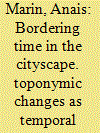

|
|
|
|
|
| Publication |
2012.
|
| Summary/Abstract |
Place renaming is an archetypical feature of regime change in (post-)Soviet Russia. In the case of Leningrad / St. Petersburg it is interpreted here as an attempt at temporal boundary-making: in renaming streets, local elites tried to erect a symbolic time border between 'old' and 'new'. Since post-Soviet renaming mostly amounted to returning to places the maiden names they bore in the imperial period, toponymic changes since the perestroika did not imply a radically new semiotic mapping of the cityscape. In choosing memory landmarks for cultural self-identification that refer to an idealised European past, place-namers also tried to establish normative boundaries to situate St. Petersburg in a desired geopolitical space. Like other discursive constructions, these renaming processes are not free of contradictions however.
|
|
|
|
|
|
|
|
|
|
|
|
|
|
|
|
| 2 |
ID:
111645
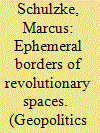

|
|
|
|
|
| Publication |
2012.
|
| Summary/Abstract |
From the Paris Commune to the Red Shirt uprising in Bangkok, revolutionaries lacking the power to overthrow their states or depose unpopular politicians have captured parts of major cities and formed their own temporary enclaves of resistance. These groups create intraurban borders by building barricades, arming themselves, and fighting to protect their space. The borders, while temporary and usually ineffective, are powerful symbols as they separate a sphere of active resistance from territory under state control. While these borders stand, they are challenges to state power - lines marking the limits of what states can control. This essay looks at how these borders arise and how they relate to more familiar types of borders. Revolutionary borders are shaped by many of the same forces as national borders, most notably globalisation, but have a distinct character that is closely linked to the changing geography of urban areas.
|
|
|
|
|
|
|
|
|
|
|
|
|
|
|
|
| 3 |
ID:
111643
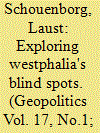

|
|
|
|
|
| Publication |
2012.
|
| Summary/Abstract |
The point of departure for this article is the realisation that the regional dimensions of international society have not been conceptualised adequately by International Relations scholars. One consequence of this, I argue, is that what could have been understood as regionally led change has been framed as revolutionary exceptions or imperialist drives for power aggregation. I attempt to develop this point by demonstrating how, for example, the EU and international fascism (in this article mainly associated with Germany, Italy and Japan during World War II) might instead be considered as cases of regional differentiation within international society. Two things are accomplished via this analysis. First, the cases are 'normalised', making a more accurate historical description of their respective developments possible. Second, by taking these regionally led developments seriously, the potential for fundamental change to the core institutions of international society becomes a distinct possibility and thus unsettles our whole Westphalian imagination.
|
|
|
|
|
|
|
|
|
|
|
|
|
|
|
|
| 4 |
ID:
111640


|
|
|
|
|
| Publication |
2012.
|
| Summary/Abstract |
China's double-digit average growth in the last twenty years has built up manufacturing and industrial behemoths that helped move the country from an agrarian society into a major economic player in the global economy. This prosperous growth coupled with construction of urban infrastructures and the rapid adoption of profligate lifestyles has created dependency on energy sources, raw materials and natural resources that need to be secured to maintain commercial, economic, and social wheels turning. In failing to sustain growth and security, both of which are national priorities, the Chinese Communist Party faces ideological and political risks. As a result, China's global resources quest is taking it to faraway lands and its presence as well as its motives and mechanisms raises geopolitical issues around the globe.
|
|
|
|
|
|
|
|
|
|
|
|
|
|
|
|
| 5 |
ID:
111638


|
|
|
|
|
| Publication |
2012.
|
| Summary/Abstract |
Despite the fact that Europe and the EU are two different concepts, they increasingly seem confused within EU policy discourse. By means of the European Neighbourhood Policy (ENP) the EU drafts a desired future of a peaceful and prosperous Europe with recognisable imaginative symbolic and cultural characteristics. In the ENP documents the EU imagines its neighbouring countries as possible European space of influence, yet to be Europeanised. This rather Eurocentric belief that neighbouring states can be 'Europeanised' through the idea of conditionality and socialisation but without the prospective of becoming EU member has provoked an appeal for a different and more critical geopolitical perspective.
This article takes Michel Foucault's concept of heterotopias as inspiration for an alternative geopolitical view on Europe. Foucault's concept of heterotopic spaces provides a critical framework that is capable of countering the geo-political imaginations of a universal Europe. Foucault has used the idea of a mirror as metaphor for the contradictions between the image and reality. In this context heterotopias are considered places that disturb the utopian image by means of complexity, contradiction and diversity. This article is in search of heterotopic spaces of resistance, that I have titled 'The Other Spaces of Europe'. They are other spaces and seemingly resist the utopian projections of a common European neighbourhood. The drafts and ideas of the ENP gain new light against the background of these places of resistance that each in their own distinctiveness represents a certain impossibility of a final version of Europe.
|
|
|
|
|
|
|
|
|
|
|
|
|
|
|
|
| 6 |
ID:
111647
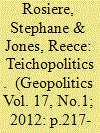

|
|
|
|
|
| Publication |
2012.
|
| Summary/Abstract |
This article considers the trend in many countries towards securitised immigration policies and "hardening" of borders through the construction of walls or fences. In contrast the borderless world of globalisation, it identifies these attempts to strengthen control of borders as teichopolitics: the politics of building barriers. This article analyses the different types of hardened borders that exist today and proposes a typology of frontlines, fences/walls, and closed straights. Then the article maps the locations of these barriers and argues that although other justifications ranging from smuggling to terrorism are often put forward, these barriers are mostly connected with managing immigration flows. Indeed, many of these barriers are located on important economic or social discontinuity lines, precisely where the system reveals its underlying logics. These walls and fences symbolise the emergence of a privileged few who actually live the promise of globalisation and defend its privileges through teichopolitics.
|
|
|
|
|
|
|
|
|
|
|
|
|
|
|
|
| 7 |
ID:
111642
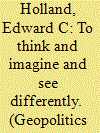

|
|
|
|
|
| Publication |
2012.
|
| Summary/Abstract |
This paper, while acknowledging the import of popular geopolitics for understanding how foreign policies are interpreted in an everyday sense, argues that this literature has glossed over a set of key oppositional cultural formats, such as documentary films, satirical newspapers, and non-fiction comic books (referred to here as graphic narratives), which also influence the geopolitical imaginations of their consumers. Using Ó Tuathail's concept of the anti-geopolitical eye, the paper considers how popular geopolitical understandings are constructed, arguing that these oppositional formats, and graphic narratives in particular, challenge hegemonic scriptings of geopolitics through a bricolage of narrative techniques. Discussing the work of comics journalist Joe Sacco and his graphic narrative "Chechen War, Chechen Women" in detail, the paper considers how three distinct narrative techniques he employs - historical interlude, the singular panel, and the depiction of the banal - make possible a counter-hegemonic reading of the individual, localised consequences of the Chechen conflicts.
|
|
|
|
|
|
|
|
|
|
|
|
|
|
|
|
| 8 |
ID:
111639


|
|
|
|
|
| Publication |
2012.
|
| Summary/Abstract |
A central goalpost characterising the European Union has consisted of escaping Europe's notorious past, and this aspiration has then also profoundly impacted the Union's approach to the construction of political space. Sovereignty has for the EU subsequently been off limits. However, the more recent claim of the Union having succeeded in reaching its initial goal of leaving the past behind radically alters the situation. It does not merely set the EU free but also compels it to reconsider the underlying generative grammar. Does this then also mean that the EU is bound to return to more sovereignty-geared approaches premised on clear distinctions between self and other or does it still aspire to stay with the previous script by refraining from adopting the rather strict organising principles characteristic of modern states? This is the issue that the article sets out to explore by focusing on the concept of a neighbour which has recently been added to the EU's repertoire of key constitutive departures through the recent coining of the European Neighbourhood Policy (ENP).
|
|
|
|
|
|
|
|
|
|
|
|
|
|
|
|
| 9 |
ID:
111641


|
|
|
|
|
| Publication |
2012.
|
| Summary/Abstract |
In recent years, zombies have enjoyed a dramatic renaissance in various forms of popular culture. This essay argues that the current obsession with the walking dead, and particularly the looming threat of human-zombie conflicts, is a reflection of the dangers of invasive alterity associated with uncontrolled spaces in a globalised world. This shift is especially prevalent in the United States following 9/11, as zombies have become phantasmal stand-ins for Islamist terrorists, illegal immigrants, carriers of foreign contagions, and other 'dangerous' border crossers. Through three case studies which examine zombie 'outbreaks' on the local, national, and global levels, respectively, I discuss the importance of borders and geopolitical spaces in recent fictional depictions of human-zombie conflicts. As metaphors for illicit globalisation, zombies have emerged as a key pop-culture referent of the porous nature of socio-cultural, political, and physical boundaries in a global age defined by an emotional geopolitics of fear.
|
|
|
|
|
|
|
|
|
|
|
|
|
|
|
|
| 10 |
ID:
111644
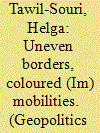

|
|
|
|
|
| Publication |
2012.
|
| Summary/Abstract |
The Israeli state apparatus mandates differentiated IDs to Palestinian citizens of Israel, Palestinian non-citizens in East Jerusalem, Palestinians in the West Bank and Gaza. The bureaucracy of Palestinian ID cards since 1948 has rendered Palestinians more legible for the security interests of Israel while simultaneously discriminating Palestinians from Jews as unequal citizens and non-citizens. The ID card regime, and less so the permit regime, limits Palestinian geographic movement and economic mobility while simultaneously permitting freer Jewish-Israeli flows and mobilities. ID cards demonstrate the power of the Israeli regime to produce distinct people and bind them to specific territories (such as the Palestinians), while allowing others (Jewish-Israelis) to 'trespass' over those same boundaries. Through ID cards borders are erected between Jewish and Arab people, not Israeli and Palestinian territory. The ID card regime puts into question the nature and territorial boundaries of 'Israel', and the geopolitical existence of the 'Palestinian Territories.
|
|
|
|
|
|
|
|
|
|
|
|
|
|
|
|
|
|
|
|
|